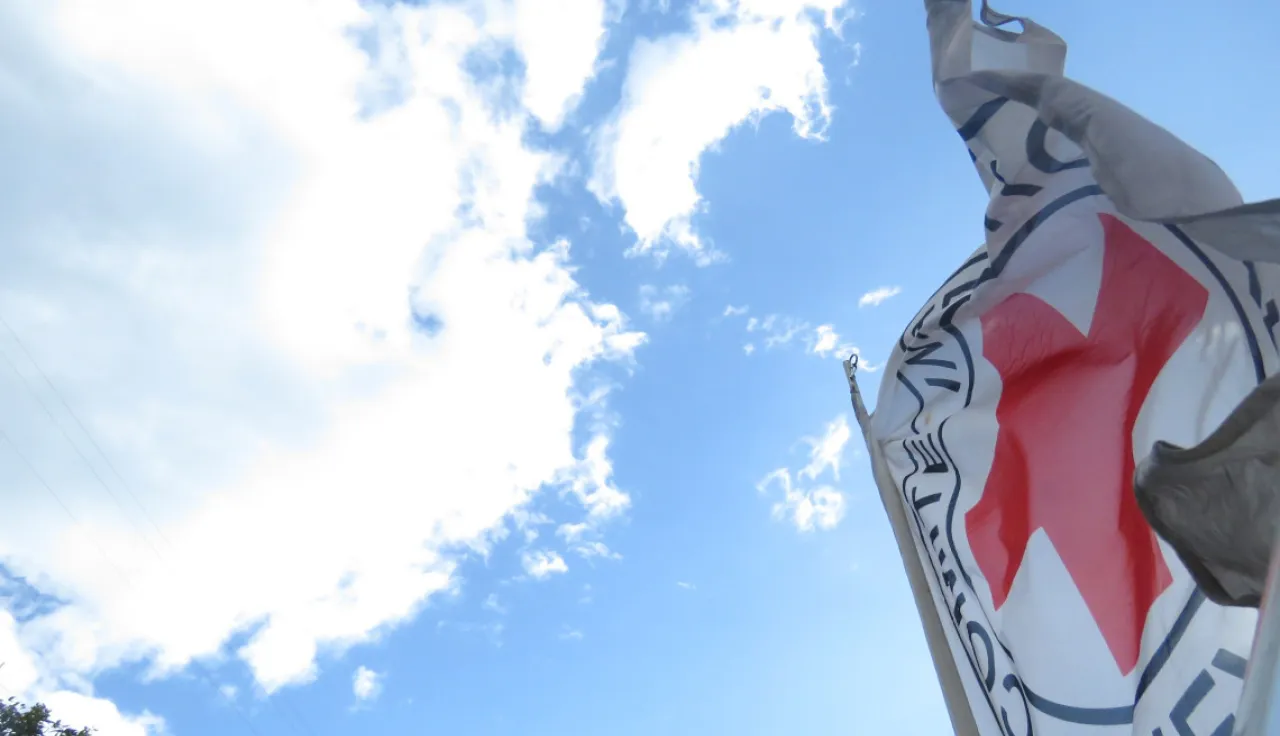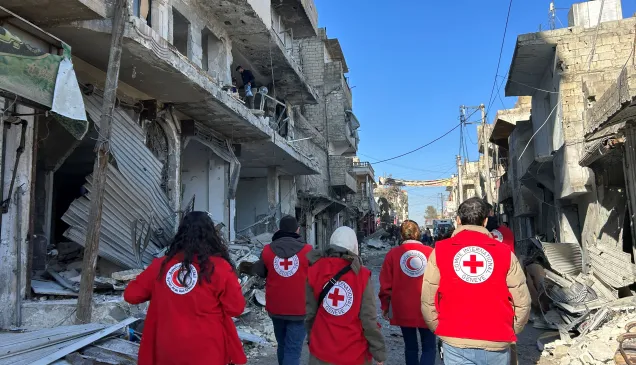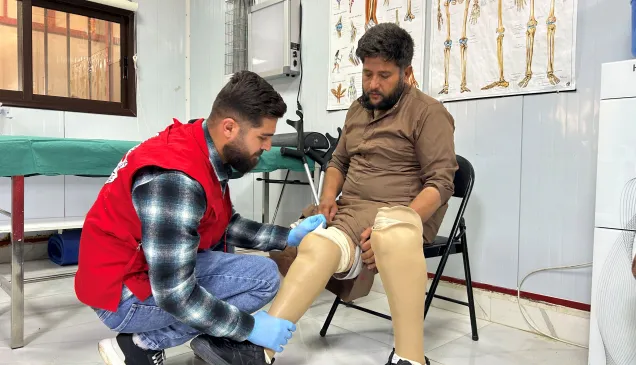Frequently asked questions: Our work in Syria

For 13 years, people in Syria have endured devastating armed conflicts and crises that have affected every aspect of their lives. Recent events have unfolded rapidly, bringing colossal changes, and adding uncertainty about the future. This reflects a familiar pattern in such complex contexts—the compounding effects of hostilities, humanitarian crises, and, at times, natural disasters. Civilians always bear the brunt of these layered challenges, facing violence, instability, and disruptions to their daily life, livelihoods and access to essential services.
The ICRC has been supporting communities in Syria since 1967. Today, our focus is on protecting and assisting vulnerable populations affected by over a decade of conflict and crises. This page provides accessible information for those who wish to know how the ICRC can help and addresses frequently asked questions about our work and international humanitarian law (IHL).
THE WAY WE WORK
-
Useful information for people affected by the conflict in Syria
Over 13 years of armed conflict have left millions in Syria in dire need of humanitarian protection and assistance.
The ICRC is committed to expanding its access to all communities in need, including places of detention, to visit detainees, ensure humane treatment, and promote detention conditions aligned with international standards.
Additionally, the ICRC works with Syrian authorities to support the tens of thousands of families searching for missing loved ones. To aid this process, the ICRC offers its expertise in preserving official records—such as those from prisons, hospitals, and morgues—and protecting gravesites to ensure future identification efforts are possible.
The ICRC continues to deliver emergency humanitarian assistance to meet the immediate needs of civilians affected by hostilities and violence.
In a country where 90% of the population lives below the poverty line and 7.2 million are internally displaced, the ICRC also focuses on improving access to essential services, such as water, electricity, and healthcare, while supporting microeconomic initiatives to help rebuild communities.
-
Syria: What is the ICRC's contribution in the search for missing people?
Since the armed conflict began in 2011, the ICRC, along with Red Cross and Red Crescent partners, has registered 35,000 cases of missing persons in Syria based on requests from families. The actual number is likely far higher.
Over the past 13 years, the ICRC has supported families of the missing with mental health, financial assistance, and by working with Red Cross and Red Crescent Movement partners to find the answers families so desperately seek.
The search for missing persons is a complex, long-term process requiring the collaboration of authorities, conflict parties, civil society organizations, and international actors. The ICRC remains committed to standing with families in their quest for answers.
Families seeking information about their missing loved ones can contact the ICRC or their nearest Red Cross or Red Crescent office.
-
Under international humanitarian law (IHL), the remains of those who die during conflict must be handled respectfully and with dignity. This includes recovering, analyzing, and identifying remains to provide families with answers.
The ICRC is concerned about reports of mass graves being opened in Syria, jeopardizing the preservation of human remains. The ICRC urges authorities to protect gravesites until professional recovery efforts can be conducted.
With extensive expertise in the management of the dead, the ICRC can support local authorities through training and capacity-building to ensure proper handling and identification of remains. The ICRC is ready to offer its services to preserve gravesites and protect human dignity.
-
ICRC Head of Delegation in Syria: Detention Work Remains Our Top Priority
While the ICRC was the only international organization granted access to detention facilities in Syria over the past 13 years, this access was limited. Many facilities, especially those managed by security apparatuses, remained off-limits.
Since the conflict began, the ICRC has sought to expand its access to detention facilities, continuing these efforts through November 2024. Although it has visited facilities under the Ministry of Interior and the Ministry of Social Affairs and Labor, many others remain out of reach.
The ICRC continues to offer its services to all parties in Syria to visit detainees, promote humane treatment, and improve detention conditions.
-
In a country affected by armed conflict or other situations of violence, the ICRC and that country's National Society − the ICRC's primary partner − coordinate operational activities to ensure that the response to the needs of the communities affected is relevant, efficient and complementary. The ICRC and the country’s National Society are bound by the same Fundamental Principles of the International Red Cross and Red Crescent Movement.
The Syrian Arab Red Crescent (SARC) is the ICRC’s natural and primary partner in Syria. Together, ICRC and SARC have worked to address the most pressing needs of millions of people.
The ICRC and SARC’s joint efforts have included delivering medical services, assisting people in hard-to-reach areas, equipping shelters for internally displaced people, providing food and essential aid, and restoring family links.
In the transition period Syria is going through, the ICRC continues to collaborate with SARC to maintain humanitarian action across the country, including in newly accessible areas such as northwest Syria.
-
The ICRC has always been ready to respond to the humanitarian needs of all civilians affected by the armed conflict in Syria. However, access to northwest Syria depended on obtaining acceptance and receiving the necessary security guarantees from all parties involved to safely deliver humanitarian aid.
Throughout the conflict, the ICRC worked tirelessly to establish and maintain confidential, bilateral dialogue with all sides to reach those in need. From 2015 to 2018, in collaboration with the SARC, the ICRC conducted crossline operations to deliver assistance, including surgical and medical supplies, to families in besieged areas.
Although the ICRC could not maintain a physical presence everywhere, it continued supporting communities in parts of Idlib and northern Aleppo over the past 13 years, including during the 2023 Türkiye-Syria earthquake.
Now, with evolving conditions on the ground, the ICRC is optimistic about expanding its reach and quickly accessing areas that were previously inaccessible, enabling better support for those in need.
-
To rebuild their lives, people in Syria need access to essential services, such as water and sanitation, health, and education. Therefore, principled humanitarian aid should be shielded from the negative impacts of restrictive measures.
While humanitarian operations are technically exempt from sanctions, the complex processes and risks associated with operating in Syria have made banks and suppliers reluctant to engage.
Sanctions have also contributed to increased aid dependency, placing additional pressure on humanitarian organizations when funding does not meet rising needs.
-
The ICRC has an important presence in Hassakeh, where it is one of the key organizations providing protection and essential services.
Key activities carried out by the ICRC include:
- Visits to families of foreign fighters in Al-Hol and Al-Roj camps.
- Detention visits, including at Ghweiran Prison and two juvenile centers.
- Restoring family links.
- To respond to the huge medical needs, the ICRC runs a field hospital in Al-Hol camp and provides primary healthcare and mental health support to camp residents through the SARC-operated mobile health clinic.
The humanitarian conditions in Al-Hol and Al-Roj camps remain dire. Over 43,000 people from more than 70 countries live in these camps, including more than 18,150 Iraqis, 16,400 Syrians, and 8,500 third-country nationals. About 90% of the camp population are women and children, with two-thirds being children, many under the age of five. Some children have never left the camp perimeter.
In addition to camp residents, thousands of men and hundreds of boys—Syrians, Iraqis, and third-country nationals—are held in detention facilities, including two juvenile centers and Ghweiran Prison, the largest detention site. Most detainees are held without adequate legal frameworks, resulting in arbitrary detention.
Over the past five years, the ICRC has consistently and publicly urged states to repatriate their nationals from the camps and detention facilities, where they endure extremely harsh conditions.
The ICRC firmly believes repatriations are the best long-term solution to the complex humanitarian and security challenges in northeast Syria. Repatriations should respect the principles of non-refoulement, family unity, and the best interests of the child. Repatriations do not imply impunity; states are responsible for prosecuting individuals accused of crimes under international law, including war crimes, and ensuring justice is served.
WHAT THE LAW SAYS
-
While there are increasing signs of normalcy across Syria, the security situation remains fragile. The ICRC is closely monitoring the situation and efforts to ensure law and order are maintained, as this is crucial for humanitarian organizations to operate safely and have unhindered access to affected areas and communities. The ICRC is also monitoring the status of newly arrested and detained individuals to ensure they are treated humanely. Additionally, hostilities between various groups are still ongoing in several regions, including the south, north, and northeast of Syria. As a result, Syria continues to experience conflict and violence, and it is essential that all parties respect international humanitarian law (IHL) and international human rights law (IHRL).



